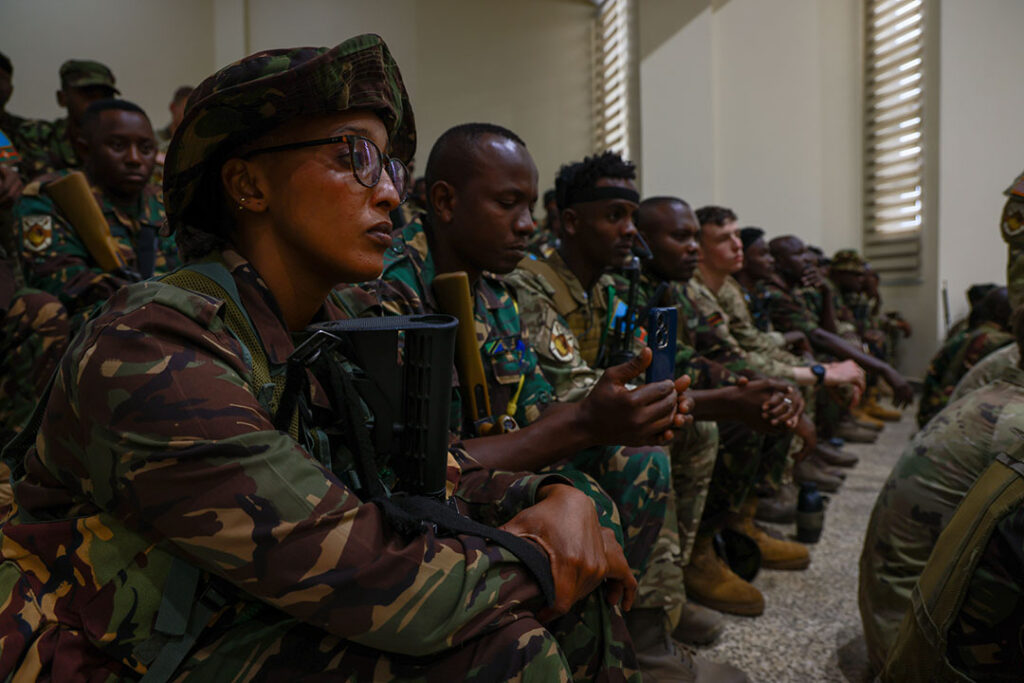Ask experts for solutions to Africa’s myriad security challenges, and many are likely to call for greater cooperation, training and professionalism among the continent’s armed forces. For many military and security personnel, the path toward that goal leads through one of Africa’s many centers of excellence.
Over the last 25 years or so, Africa has experienced a boom in institutions designed to help its military leaders understand and respond to key security issues — everything from artificial intelligence (AI) and counterterrorism to maritime security and empowering noncommissioned officers.
Centers of excellence are hubs of specialized knowledge designed to develop leadership, expertise and best practices in specific fields. Africa’s centers operate at national, regional and continental levels. Some, such as the East African Police Chiefs Cooperation Council, have spent decades helping their members collaborate on security issues. Others, such as South Africa’s Defence Artificial Intelligence Research Unit, started in 2024, study the military implications of AI.
Regardless of their age or theme, the collective goal is to enhance security by improving the quality and capabilities of Soldiers and security personnel.
“Professionalism is very important,” Maj. Gen. Davidson Forleh, chief of staff for the Armed Forces of Liberia, told ADF during the recent Africa Chiefs of Defense summit in Nairobi. “In the past, the military was looked at as a kind of beast.”
Liberia’s military reform following its civil wars in the 1990s relied on the kind of training available at institutions such as the Africa Center for Strategic Studies, the African Union Counter Terrorism Centre and the Kofi Annan International Peacekeeping Training Centre to build a military that has become a model for professionalism and public service.
“Whether they address terrorism, maritime security, enhancing African peacekeeping missions, or other issues, a lot of the solution sets to these national security challenges require responses that have to go beyond kinetic actions,” Catherine Kelly, an expert on democratization and governance at the Africa Center, told ADF in an interview.
Centers of excellence aren’t intended to take the place of military academies or defense university, Kelly said. Rather, they complement the work of those institutions by providing leaders with a space to share ideas with their colleagues, many of whom face the same issues. Civilian experts bring a perspective on problems and solutions driven by academic research.
Forleh said the relationships leaders build while attending a center of excellence often translate to greater cooperation among nations and militaries in the real world. He cited Liberia’s work with Sierra Leone and Côte d’Ivoire to patrol their shared coastal waters in the western Gulf of Guinea.
“Bilateral relationships, when they’re aligned with regional goals, are not only necessary — they are essential,” Forleh said.
Above all, the education and experiences inherent in centers of excellence expand the growing professionalism of militaries across Africa as the lessons learned by high-ranking leaders spread through the ranks, according to Kelly.
“If the values and ethics that professionalism entails are not inculcated by the leaders in African militaries, it’s difficult for those to have an effect in the lower ranks of the security services,” she said. “Centers of Excellence help existing and emerging leaders think through how they’re going to tackle the root causes of some of the prime security challenges they face.”
The rise of centers of excellence reflects an ongoing shift in the mindset and mission of military leaders across Africa, but particularly in Liberia, said Forleh.
“The new military is different from the past,” he said. “We have shifted the entire military to be a force for good.”

